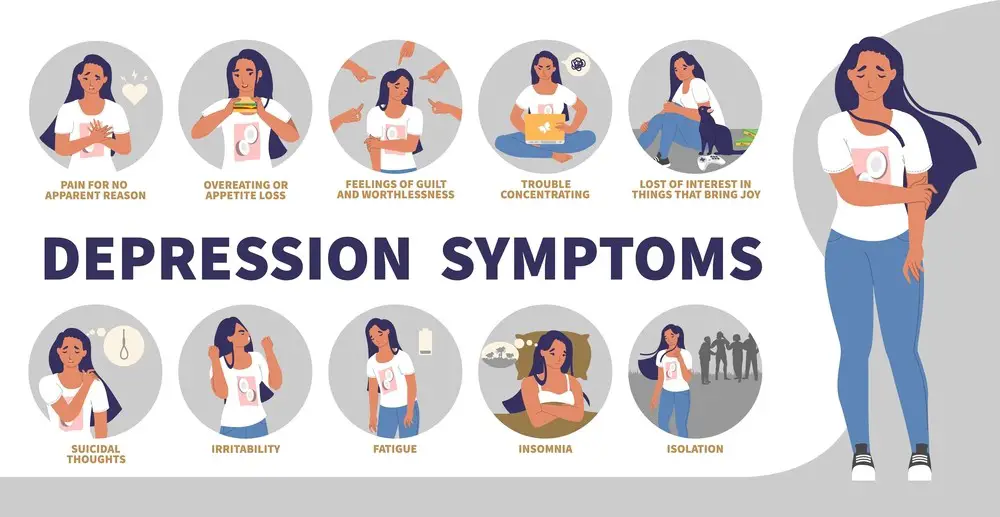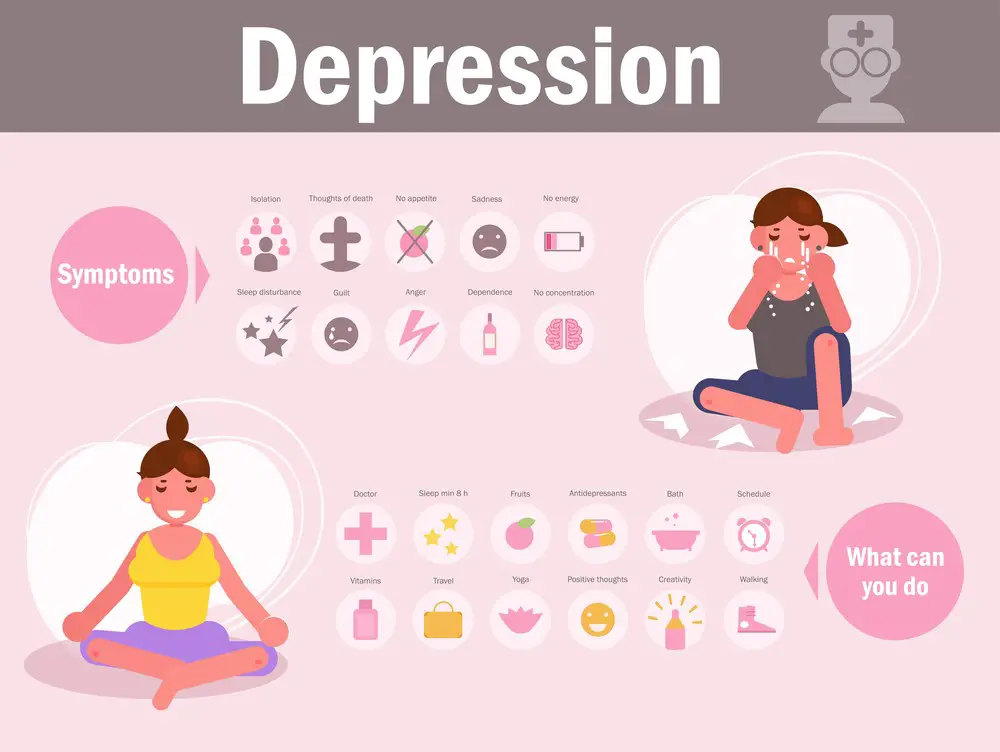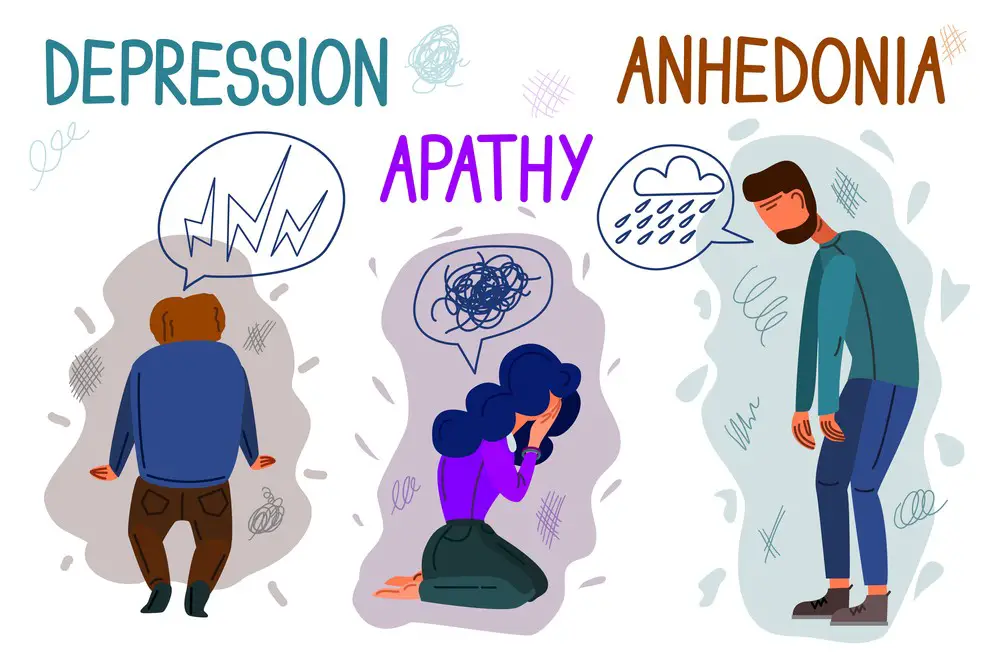As a BetterHelp affiliate, we receive compensation from BetterHelp if you purchase products or services through the links provided
Countless individuals face the all-too-common challenge of feeling depressed due to their jobs. Various factors, such as work stress, long hours, or a toxic environment, sometimes contribute to job-induced depression. Unfortunately, quitting the job may not always be an option, leaving these individuals trapped in a seemingly endless cycle of misery.
Understanding the signs and symptoms of workplace depression is crucial to implementing coping strategies and overcoming this difficult situation. In this article, we will explore the factors contributing to job-induced depression, its impact on one’s professional life, and the options available when quitting is not feasible.
Key Takeaways
- Recognize and address the factors contributing to work stress and depression.
- Explore coping strategies for managing workplace depression
- Consider seeking professional help when necessary
 Understanding Job-Induced Depression
Understanding Job-Induced Depression
Job-induced depression is a mental health condition that can arise when stress and other factors related to one’s occupation become overwhelming. It is essential to be aware of depressive symptoms and recognize the signs of depression at work, as it can significantly impact an individual’s overall mental health and well-being.
Depression is a common mental health disorder marked by persistent sadness, hopelessness, and a lack of interest or pleasure in activities. In job-induced depression, these feelings may be directly linked to the nature of one’s work, difficult relationships with coworkers or managers, or an unhealthy work environment.
Common symptoms of job-induced depression include, but are not limited to:
- Decreased motivation and productivity
- Difficulty concentrating or making decisions
- Irritability and increased frustration
- Fatigue and exhaustion, despite getting enough sleep
- Feelings of worthlessness or guilt related to job performance
- Loss of interest in work or career
It is crucial to understand that individuals may experience varying degrees of these depressive symptoms, and the presence of one or a few of these signs does not necessarily mean that someone has a severe mental health condition. However, if these symptoms persist or worsen over time, it may indicate an underlying issue that needs to be addressed.
Stress is a significant factor that can contribute to job-induced depression. Prolonged exposure to high-stress work situations can harm mental health and mood, potentially leading to or exacerbating depressive symptoms. Examples of stressors at work can include unrealistic deadlines, inadequate support, or an excessive workload.
To manage job-induced depression, it is important first to recognize and validate the feelings and symptoms experienced. Developing a support network of friends, family, or mental health professionals can be beneficial in coping with this mental health condition. By acknowledging job-induced depression and proactively seeking assistance, individuals can take essential steps to manage their mental well-being and improve their quality of life.
 Factors Contributing To Work Stress And Depression
Factors Contributing To Work Stress And Depression
Various factors can influence work stress and depression. Long hours at work can lead to burnout, leaving individuals feeling physically and mentally exhausted. Extended periods of intense workload can exacerbate stress levels, leading to job-related depression.
Working conditions can play a significant role in the development of job stress. Unfavorable environments, such as those that are noisy, unsafe, or poorly ventilated, can increase stress levels. Additionally, professions in STEM fields may pose unique stressors due to the constant pressure to innovate and stay current with rapidly evolving technologies.
Another essential factor to consider is the work-life imbalance. When employees dedicate most of their time to their profession, their personal lives may suffer, causing a strain on relationships and mental well-being. This imbalance can escalate stress and contribute to depression.
Colleagues and relations are also vital in determining job stress and depression. Interactions with difficult coworkers or supervisors can lead to increased anxiety and frustration. Workplace bullying or harassment can significantly impact an individual’s mental health.
Change, both in an organization and within one’s profession, can contribute to work stress. Restructuring, layoffs, or job insecurity can increase anxiety and depression. Moreover, the continuous need for professional growth and adaptation to new technologies or methodologies can exacerbate job-related stress.
In summary, multiple factors may contribute to work stress and job-related depression, such as long hours, heavy workloads, working conditions, work-life imbalance, challenges with colleagues, and constant change within one’s profession. It is crucial for employees and employers to be aware of these factors and strive to create healthy, supportive work environments to mitigate the risk of depression.
 Physical And Emotional Symptoms Of Workplace Depression
Physical And Emotional Symptoms Of Workplace Depression
Workplace depression can manifest in various physical and emotional symptoms. These symptoms not only affect a person’s job performance but also their overall well-being. Understanding and recognizing these symptoms is essential to identify workplace depression and seek appropriate help.
Fatigue is a common symptom of workplace depression. It can lead to reduced productivity, lack of motivation, and increased errors in one’s work. Insomnia, or difficulty falling or staying asleep, is another symptom that can contribute to exhaustion and affect overall physical health.
Headaches, which may increase in frequency and intensity, can also be linked to workplace depression. Prolonged stress and tension can lead to high blood pressure and heart disease.
Changes in weight—such as weight loss or weight gain—often occur due to depression. These changes can be attributed to fluctuations in appetite and disrupted sleep patterns.
Mood swings are another common symptom, encompassing sadness, irritability, or anger. Irritability, in particular, can lead to conflicts with colleagues and negatively impact professional relationships.
Noticeable changes in sleep are common among those experiencing workplace depression. These sleep changes can include difficulty falling asleep, waking up throughout the night, or oversleeping.
Prolonged workplace depression has the potential to affect an individual’s mental and physical health significantly. Awareness of these symptoms is the first step in addressing the issue and seeking appropriate assistance and guidance.
 Impact Of Depression On Professional Life
Impact Of Depression On Professional Life
Depression can have a significant impact on an individual’s professional life. One common outcome is a lack of motivation. This often results in low productivity, as employees struggle to perform their duties. Work depression can also harm professional growth, as individuals may not effectively showcase their skills and abilities.
Work-related stress is a key factor contributing to burnout syndrome, which can exacerbate depression. It is essential to recognize the signs of burnout and take steps to address these issues before they spiral out of control. In many cases, people who experience work depression may become impatient and irritable, impacting their relationships with colleagues and supervisors.
Apart from deteriorating one’s mental well-being, work depression can lead to physical symptoms such as fatigue, headaches, and muscle pain. These symptoms and the emotional toll can hinder an individual’s ability to focus on tasks and maintain their efficiency in the workplace.
In summary, the impact of depression on one’s professional life can lead to various challenges, such as lack of motivation, low productivity, work-related stress, and burnout syndrome. Identifying and addressing these issues is essential to maintain a healthy work-life balance and prevent further implications on career success.
 Options When You Can’t Quit Your Job
Options When You Can’t Quit Your Job
Job stress can take a toll on one’s mental health, leading to feelings of depression. When circumstances make quitting the job unfeasible, it’s crucial to explore alternative options to alleviate the impact of depression on daily life.
Financial obligations play a significant role in limiting the choice to leave a job. For workers struggling with depression, seeking support from friends, family, or professional help can be invaluable. Many companies offer an Employee Assistance Program (EAP), a resource that provides access to confidential counseling and mental health services. EAPs can help employees navigate personal and work-related challenges and should be considered an accessible resource.
Another option is to discuss the situation with managers, who might be willing to explore adjustments to the employee’s schedule or workload. This can lead to a healthier work-life balance, improving overall mental health. Additionally, involving managers can enable a more supportive and understanding work environment.
For individuals whose depression is affecting their ability to perform their job, legal protections like the Americans with Disabilities Act (ADA) can offer support. The ADA mandates reasonable accommodations for employees with disabilities, which can include depression. Requesting accommodations under ADA can lead to adjustments in work schedules, deadlines, or communication methods catered to an employee’s needs.
Employees might consider exploring different options within their profession regarding security and stability. This could mean seeking a different role within the same company, finding a new job within the same field, or even undergoing additional training to branch out further within the industry.
In conclusion, when quitting a job is not an option, individuals can pursue various resources and alternatives to cope with depression while addressing job stress. Employees can improve their mental well-being and thrive in their profession by seeking support and utilizing legal protections.

Coping Strategies For Managing Workplace Depression
Workplace depression can stem from various factors, such as stress, poor work-life balance, and strained relations with colleagues. It’s crucial to identify effective coping strategies to manage this emotional state. By implementing healthy habits, individuals can mitigate the effects of depression on their overall well-being.
Regular exercise is essential, as physical activity can release endorphins and improve mood levels. Exercise can be easily incorporated into daily routines by engaging in activities like walking, jogging, or attending a yoga class. Yoga offers additional benefits, combining gentle physical movement with deep breathing and meditation techniques. These components work together to promote relaxation and alleviate stress.
Practicing mindfulness and meditation can help individuals stay grounded and focused in the present moment, reducing feelings of anxiety and depression. Setting aside time daily to breathe deeply and engage in self-reflection enables greater mental clarity and improved emotional resilience.
Managing stress is a cornerstone in the battle against workplace depression. Creating a comfortable work environment, setting realistic goals, and learning to prioritize tasks can effectively reduce work-related stress. An essential part of managing stress is taking breaks and ensuring adequate rest – stepping away from the workspace periodically throughout the day, and getting sufficient sleep at night.
In addition to taking care of oneself physically and mentally, a balanced diet can also play a significant role in managing workplace depression. Consuming healthy, nutrient-rich foods can increase energy levels and improve cognitive function.
Finally, developing a support system is invaluable for coping with workplace depression. Building positive relationships with colleagues, supervisors, friends, and family can offer a necessary outlet for discussing concerns and sharing emotional burdens. Seeking professional assistance from a therapist or counselor can provide additional resources for addressing depressive symptoms and managing stress more effectively.
Seeking Professional Help
When an individual feels that their job is causing depression, seeking professional help is crucial. A counselor or therapist can provide valuable support and guidance. They can help the person explore their feelings and emotions and identify potential coping strategies to manage the stressors of their job.
In some cases, medical professionals may recommend medication to help alleviate the symptoms of depression. Antidepressants or other medicines prescribed by a doctor can benefit those struggling with a job-related mental health condition. It’s important to remember that medication should always be taken under the supervision of a healthcare provider.
Many employers offer Employee Assistance Programs (EAPs) which provide confidential support, counseling, and resources for employees dealing with personal and work-related challenges. Taking advantage of these programs can be a proactive step towards finding a solution and managing one’s mental health.
Reaching out to friends and family during difficult times can provide much-needed support. Sharing one’s experiences with trusted individuals can help alleviate isolation and build a support network.
In conclusion, seeking professional help is a valuable step toward addressing the impact of a job on one’s mental health. With the assistance of a counselor, therapist, or medical professional, individuals can find the support they need to navigate through challenging times and ultimately find a solution that best aligns with their needs.

Overcoming Job-Induced Depression: A Review
Workplace depression has become a significant concern in recent years, affecting mental and physical health. Depression at work can manifest as depressive symptoms, hopelessness, and being overwhelmed. This impacts an individual’s well-being and results in reduced productivity.
One essential strategy to address this challenge is fostering coping mechanisms. Developing healthy strategies can help alleviate depressive symptoms and improve mental health. Some common coping techniques include:
- Mindfulness: Practicing mindfulness is a proven approach to managing stress and improving mental health. Incorporating guided meditation or grounding exercises into daily routines can help individuals maintain balance and control.
- Physical Activity: Engaging in regular physical activity is vital for general well-being. Exercise has been shown to reduce depressive symptoms, boost mood, and improve overall physical health.
- Social Support: Building and maintaining healthy relationships with friends, family, and colleagues can help combat feelings of isolation and hopelessness. A strong support network offers encouragement and alternative perspectives in challenging times.
- Professional Help: In some cases, consulting with mental health professionals, such as therapists or psychologists, can provide valuable advice and resources for overcoming job-induced depression.
In conclusion, overcoming job-induced depression requires a multifaceted approach considering various factors. Individuals can work towards a more balanced and fulfilling professional life by implementing effective coping strategies and seeking professional guidance.
Conclusion
In conclusion, many individuals experience depression due to their jobs. This situation may occur for numerous reasons, such as a toxic work environment, stress, lack of satisfaction, or overwhelming responsibilities.
One of the crucial steps is to recognize the signs of depression and seek help from a mental health professional. They can provide tailored advice, coping strategies, and guidance on treatment options. Moreover, discussing the issue with trustworthy friends or family members for support is essential.
Healthy habits and stress management techniques, such as exercise, mindfulness, and setting boundaries, can positively impact mental health. Additionally, employees can consider discussing their concerns with supervisors or human resources to explore potential changes in job responsibilities or work conditions.
Although quitting might not be an immediate option for everyone, it is essential to remember that their well-being should ultimately be the priority. It could be helpful to start planning an eventual transition by exploring alternative career paths, improving essential skills, and networking with professionals in the desired field.
By addressing the causes of work-related depression and taking proactive steps to improve their mental health, individuals can gradually regain control and enjoyment. This personal growth may lead to a more fulfilling career aligned with their values and needs.
Frequently Asked Questions

How to cope with ….
my job is killing me but I can’t quit
Many people feel trapped in jobs that hurt their mental health. Identifying the reasons for feeling this way and seeking support is crucial. Discussing the issues with someone you trust or a therapist can help you gain perspective and develop coping strategies.
My boss is making me depressed
A toxic boss can have a severe effect on your well-being. One option is to seek help from human resources or an upper manager. If that does not improve the situation, consider seeking a new job or changing careers to prioritize your mental health.
Work depression symptoms
Work-related depression can manifest through symptoms such as difficulty concentrating, constant fatigue, irritability, hopelessness, and thoughts of self-harm or suicide. If you experience any of these symptoms, it is crucial to seek professional help immediately.
Depression and work performance
Depression can significantly impact work performance, decreasing productivity, poor decision-making, and frequent absences. Both employees and employers must recognize these signs and address them accordingly, potentially providing accommodations or mental health support.
I want to quit my job but can’t afford to
Financial stability is a crucial factor in decision-making. One option is to look for another job while still actively employed. This provides income and lessens the gap between employment, ensuring financial security. Networking and building connections may increase job opportunities.
Too depressed to work but need money
If you cannot work due to depression, consider seeking short-term disability benefits or government assistance programs for financial support. Seeking treatment for your mental health is paramount for recovery and re-entering the workforce when you feel better and ready to do so.
As someone who has battled depression while navigating a difficult custody battle with a narcissistic ex-partner, I understand the importance of seeking help and support when dealing with mental health challenges. I take Lexapro to manage my symptoms and prioritize self-care practices like taking long daily walks to clear my head.
Despite the ongoing court battle with my ex-partner’s severe case of narcissism and her complete alienation from our children, I remain committed to fighting for their well-being and doing what I can to manage my mental health. It can be incredibly difficult to deal with someone who consistently breaks court orders and refuses to co-parent.
To provide support and guidance to others who may be facing similar challenges, I write articles about mental health and narcissism. I also have a legal site where I help others dealing with a spouse who refuses to comply with court orders and weaponizes their children. I hope to provide resources and strategies for dealing with depression and navigating difficult relationships with narcissistic individuals. With the right support and resources, anyone can overcome their mental health challenges and find a path toward healing and recovery. – Jacob Maslow
- 3 Ways Wearing a Hat Can Help Lower Your Stress Levels - April 19, 2025
- Breaking the Silence: Why Men’s Mental Health Matters More Than Ever - April 15, 2025
- How to Transform a Home’s Patio Space into a Relaxing Space - March 23, 2025
This site contains affiliate links to products. We will receive a commission for purchases made through these links.


 Understanding Job-Induced Depression
Understanding Job-Induced Depression Factors Contributing To Work Stress And Depression
Factors Contributing To Work Stress And Depression Physical And Emotional Symptoms Of Workplace Depression
Physical And Emotional Symptoms Of Workplace Depression Impact Of Depression On Professional Life
Impact Of Depression On Professional Life Options When You Can’t Quit Your Job
Options When You Can’t Quit Your Job
